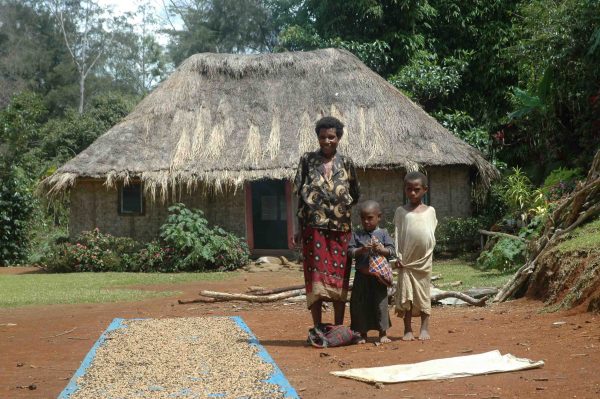This is because the interbank exchange rate, frozen between October 2013 and 4 June 2014, no longer reflected the market equilibrium of supply and demand. Forcing all foreign exchange transactions to take place at the interbank rate implied an effective appreciation of the currency by 15 per cent relative to the actual market-based exchange rate of 3 June.
What are the practical implications of moving away from a market-based exchange rate?
The first week in June 2014 was a bad one for coffee growers in PNG. Around 2.1 million people — just over a quarter of PNG’s total population of 8 million — live in households that earn a significant part of their income from coffee. At the start of the week, they could get 6 kina (US$2.16 for each kilogram of coffee they sold to the factory gate in Goroka in the PNG highlands. One week later, they could only get 4.60 kina (US$1.90 based on the higher exchange rate) a kilogram. World coffee prices had fallen by around 5 per cent. But of much greater significance was that the 15 per cent appreciation of the kina on 4 June flowed immediately through to prices obtained by farmers. This cut potential income by 15 per cent. Analysis by the World Bank shows that a 13.7 per cent decline in kina terms in coffee prices (around the impact of the 15 per cent appreciation of the kina) could have pushed an additional 130,000 people living in coffee-growing households below the poverty line. Those already below the poverty line would be even poorer. Similar losses in income faced other agricultural exporters. This single decision is having a dramatic impact on rural poverty in PNG — and the vast majority of PNG’s estimated three million poor live in rural areas.
By setting a price in international markets above market rates, the government is also creating some winners. Importers are better off, as prices for imported goods are now potentially 15 per cent cheaper. Assuming the reduction in the wholesale price is passed through to consumers, someone living in Port Moresby can now purchase a kilogram of rice for 15 per cent less than previously. Another potential winner might be someone with a new government building contract, as the costs of imported materials such as concrete and steel are now cheaper. Paying off international loans is also now cheaper in kina terms. Buying overseas property would also be cheaper for PNG residents whereas international investors wanting to invest in PNG will face higher costs. Overall, then, the decision is bad for PNG’s international competitiveness.
There are also market risks in setting the official rate higher than what demand and supply for foreign currency might dictate. Pegging the currency at an artificially high rate requires controlling the release of foreign currency from reserves. Such quantitative restrictions have many risks. Ultimately, choices must be made between which importers get access to foreign currency. Will it be importers of fuel or fertiliser or rice? The inevitable rationing of foreign exchange is a growing concern for all PNG businesses.
Despite the obvious problems with the appreciation of the kina, returning to a market-based exchange rate has risks as well, such as putting upward pressure on inflation. But there doesn’t appear to be a realistic long-term alternative. The kina has officially begun to depreciate, but at a very slow rate. It will take another two years at the current rate of depreciation to get back to the exchange rate that prevailed on 3 June. And that is a long time for PNG’s rural poor to endure lower real incomes, to discourage investment in PNG and to ration foreign exchange for businesses.
Paul Flanagan is a Visiting Fellow at the Development Policy Centre, The Australian National University. Until recently he was Chief Advisor in the Foreign Investment and Trade Policy division at the Australian Treasury.

